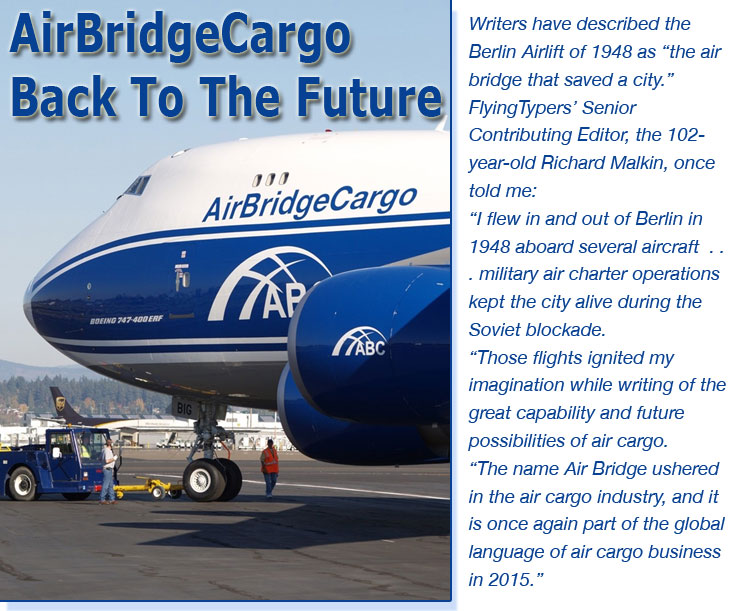
Ask
Denis Ilin, CEO of AirBridgeCargo, what is new and needs
to be shared with the global air cargo business as 2016
starts, and his answer is upbeat and immediate.
“In
2015 we have successfully continued our strategy of
fleet and network expansion based on maintaining a high
level of service and schedule reliability.
“Today
ABC demonstrates strong performance and has proven to
be one of the world’s most rapidly growing carriers
despite a challenging business year for the industry,
with some carriers reporting negative trends, parking
their aircraft, and cutting capacity down.
“ABC
has achieved a significant increase in tonnage—a
31 percent rise year-on-year with a very decent average
load factor of 67 percent.
“Growth
of cargo traffic (in FTK) has reached 24 percent, which
is mostly attributed to the introduction of longer routes
and the company’s expansion to new markets such
as Asia–USA, including transpacific flights, and
Europe–USA.
“As
a major player at one of the world’s leading markets—Asia–Europe—we
have been consistently expanding our network and developing
new destinations to respond to the diverse needs of
our customers.”
LOOKING
FOR THE NICHE
“While
average statistics show a pretty flat year and stable
excess of the capacity, ABC has been intentionally looking
for niche destinations with un-met demand or at least
a better balanced capacity-demand ratio.
“Such
expansion and a stronger presence on Asia–USA
and USA–Europe lanes have enabled AirBridgeCargo
to launch ‘round the world’ service in 2015,
which provides both a unique set of destinations for
our clients and profitable economics for our operations.
“Needless
to say that such an approach moves on-time performance
to the forefront, requiring a lot of effort to be taken
in the operational area. And we are proud to say that
our ‘delivered as promised’ (DAP) index
is over 80 percent, which is at the industry level and
for some destinations is even higher.
“In
fact, ABC is among the TOP 3 C2K (Cargo2000) companies
in terms of DAP level.
“The
value of the airline’s strategy is reflected in
the mutual trust that exists with our customers, their
confidence in ABC as a reliable business partner, and
ABC’s 11 years of sustained growth. This year,
with the clients’ support, AirBridgeCargo has
also been recognized for the quality of its service
performance with leading industry awards.
NEW
AIRCRAFT POWER FUTURE
“To
power current and further network expansion to different
parts of the world there is a need for additional capacity.
“For
some market players it came as a surprise that Volga-Dnepr
Group (a parent of ABC) and Boeing signed a MoU at the
Paris Air Show to acquire 20 B747-8 freighters over
the next seven years.
“However
for us it is just logical to support our own future.
Customers expect global coverage on both established
and new markets, a broader range of destinations, and
a fully diversified product portfolio.
“As
part of that MOU in Paris, ABC took delivery of two
brand new Boeing 747-8Fs, thus totaling its fleet to
15 airplanes.
“New
planes will be deployed under winter schedule 2015/2016
throughout ABC’s network, mainly on Asia to USA
and round-the-world routes.”
MARKETZ-APOPPIN
“ABC
has never stood still. We believe that markets keep
shifting, asking for a more diverse range of destinations,
and we have to dynamically move along,” Denis
assures.
“2015
has been no exception and brought to ABC’s network
such destinations as Helsinki (Finland), Hanoi (Vietnam),
Basel (Switzerland), Los Angeles (USA), Singapore (Singapore)
and, most recently, Atlanta (USA).
“However,
it does not mean we are slowing down on the existing
markets, as the clients not only want to see the existing
service continuing, but they’re also asking for
more.
“In
2015 ABC introduced additional frequencies to existing
destinations to improve our product to daily, and for
some destinations even double-daily services. Freighters
have always lagged behind belly competitors on this
front, as daily passenger service is much more common
in our industry.
“Now
we are able to deal with customers who require daily
uplift. Besides, it allows us to ensure a decent back-up
solution for shipments—which can run late on the
way to the airport for whatever reasons—while
keeping integrity of our own schedule without disturbing
other clients already on board.
“It
sounds very much as if we are dealing with a real passenger,
not a pallet, right? “Well, that is the reality
of today—cargo customers expect this level of
service, and we have to match these expectations.
“To
differentiate us even more from pure passenger or combination
carriers, the airline continues developing niche destinations
with limited belly capacity but still quite healthy
cargo flows, providing customers with better access
to point-to-point cargo solutions within its global
route network while guaranteeing on-time and reliable
delivery.
“Development
of such niche destinations, which lack main-deck lift
and quite often insufficient belly capacity, have become
another way to make use of the light but stable traffic
flows.
“Helsinki
and Malmo are good examples and are mostly used for
clients with freight to/from mainland China and Hong
Kong.
“ABC
started flying to Helsinki online in January 2015 and
for the first 10 months had already carried 1,195 (to
China) and 2,920 (from China) tons of cargo.”
BASEL
PHARMA & NEW DESTINATIONS
“Basel
is another example; it is known for its pharma market,
and this is the area where we are concentrating our
efforts towards developing procedures for carrying temperature-sensitive
cargo to Russia, and beyond to Asia and the Far East.
“Pharma customers want to have the option of main-deck
online capacity, and we are trying to make sure they
have a solution available. We have already witnessed
positive feedback from our clients.
“Hanoi
is popular among customers from Italy, Sweden, France,
and Germany, with monthly tonnage of at least 120 tons.
“The
U.S. and Germany are the leading destinations (monthly
tonnage on ABC of 75 tons each) out of Hanoi, which
is no surprise given its cargo nature (hi-tech, shoes,
garments, clothing, fruits, and vegetables).
“Los
Angeles is our first trans-Atlantic destination, opening
new horizons for ABC in the form of round-the-world
service.
“This
station shows growing monthly tonnage figures of 570
tons for Los Angeles–Europe and 605 tons for Shanghai–Los
Angeles in 2015 ytd.
“Following
the successful launch of Los Angeles, ABC has added
Atlanta to its schedule since November 20, thus continuing
to improve its offering on both Asia–U.S. and
U.S.–Europe lanes.
“The
USA is one of the world’s largest cargo markets
and the current main focus for AirBridgeCargo.
“Our
airline has been actively developing its presence in
the country since it introduced Chicago flights back
in 2011.
“Since
then, ABC has expanded its network to include Dallas-Fort
Worth, Los Angeles, and now Atlanta, and achieved a
compound growth rate in tonnage to/from the U.S. of
36 percent and annual volumes to/from the USA of over
56,000 tons.
“We
are open to their suggestions and ideas for new destinations.
The average market can be flat or negative, and capacity
on average is excessive, but the real business is not
about average numbers but rather about being there,
where clients need you most.
“These
needs shift very dynamically, so the real art is to
be responsive and flexible enough to amend your network
while at the same time ensuring your schedule integrity.”
WHO
IS DENIS ILIN?
AirBridgeCargo
Airlines has had Denis Ilin as Executive President (CEO)
since August 2013.
He
joined the Volga-Dnepr Group of Companies more than
20 years ago.
“Starting
my career in Volga-Dnepr Airlines back in 1995, I then
joined AirBridgeCargo Airlines management team in 2004
as Chief Operating Officer, and then in 2006 as Managing
Director of ABC.
“I
left AirBridgeCargo in 2008 to join Volga-Dnepr Group
again in April 2013.”
Denis
has a degree in Applied Mathematics and a degree in
Philology from the Moscow State University. Later, he
earned an Executive MBA from London Business School
in 2011. Married with two children—a 16-year-old
daughter and a 7-year-old son—Denis said that
after family and work he enjoys football (soccer) and
alpine skiing.
SURPRISING
CHALLENGES
Taking
an industry view, Denis Ilin notes:
“Airfreight
logistics, by its nature, is a global, macroeconomic
industry and it cannot stay out of what is happening
in the world.
“What
has surprised me the most is the degree of the challenge
and speed of changes we are facing at the moment, when
all cargo industry influencing factors have mixed together
and entwined.
“Decreasing
oil prices; currency volatility that resulted in a drop
in demand, fiercer competition, and upturn of political
risks; global unrest; security instability—these
are just a few examples of the forces that will still
be factors in the future.
“The
entire world is now moving and changing much faster;
so is our industry.
“As
one of the results, airlines are more and more reluctant
to invest in a new cargo fleet, as such long-term investments
seem riskier in view of the industry volatility.
“However,
clients still need freighters and main-deck lift, so
we have to accept these challenges, be flexible and
proactive, and find solutions to support our customers.
“We
will be working on additional measures in all the areas
concerned and surely will get over the current turbulence.”
MOTHER
RUSSIA IS VIVID
“2015
has not been an easy year for Russia: market has been
steadily declining compared with 2014.
“Almost
all international markets demonstrated negative results
in Q1 with significant drop of export tonnage to Russia
by air: ex-USA (-30 percent), ex-Europe (-28 percent),
and ex-China (-30 percent).
“However,
in Q2 we witnessed slight improvement of the situation
when the negative trend came to a stop, stabilized,
and the market ‘calmed down.’”
“What
we see today is that the Russian cargo market is becoming
more of a niche market and specializes on transportation
of certain types of cargo with ‘only by air’
requirements, such as valuable and/or time-sensitive
freight, and freight with special transportation needs.
“At
the same time, this year ABC managed to capture new
traffic to Russia from recently opened stations. For
the first 10 months of 2015 it collectively amounted
to 886 tons and we reached market share of 45 percent
ex-USA and 29 percent ex-Europe.
“We
have seen that our customers value ABC’s connectivity
options via a hub in SVO and this is the area that still
keeps its potential, especially in view of decreasing
belly capacity to Russia.
“For
the November and December 2015 reporting period we expect
seasonal increase in demand for Russian destinations.
“The
Russian domestic market is getting more vivid, especially
between Moscow and Russian destinations in the Far East
and in the North.”
QUALITY
FOR EVERYBODY
“Speaking
about bettering the air cargo industry, I would echo
IATA’s concern that the biggest advantage of delivery
by air is time—on average we are still talking
about days and weeks, but our metrics should be hours.
“Whatever
initiative needs to occur to reduce the ultimate delivery
time for our clients will only increase competitiveness
of air cargo versus other modes of transportation.
“I
really admire the many cargo veterans that serve this
great industry worldwide. “These are people who
have wonderful leadership skills and a deep understanding
of our industry, who are willing to share their ‘baggage’
with us, thus helping us to follow the straight road.
“I
have been lucky to know and work with many of them.
“They
demonstrate great professional and personal qualities,
sharing knowledge and best practices, and yet after
all these years their passion for air cargo is still
something to be learned by younger generations.
“A
personal word of thanks to everyone, with sincere wishes
for a glorious 2016,” Denis Ilin said.
Geoffrey/Flossie
|



